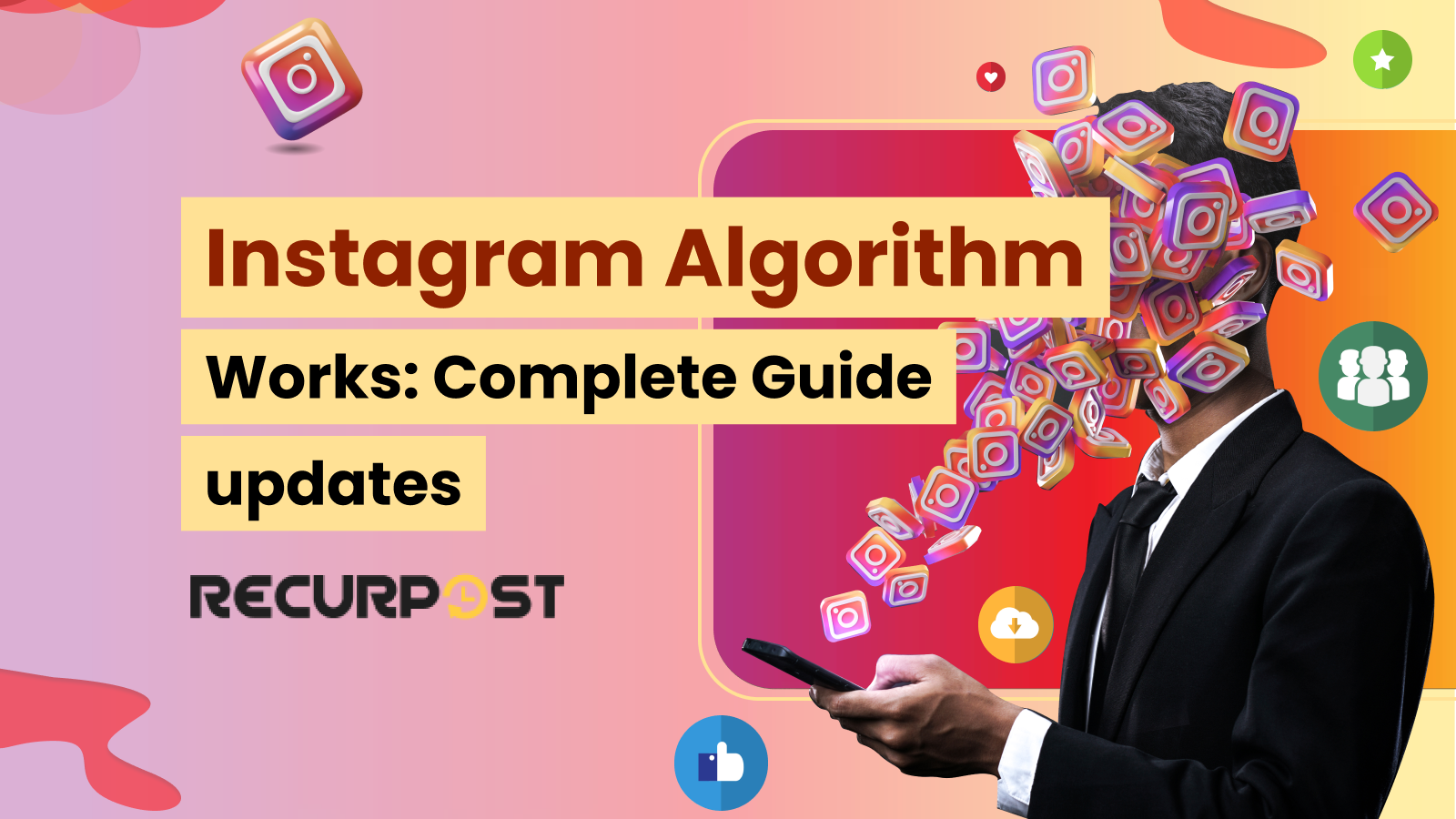The Instagram algorithm is a complex system that determines what content you see in your feed. It’s important to understand how the algorithm works if you want to reach a wider audience and grow your following.
In this blog, uncover how the Instagram Explore Page, Reels, Story, and Feed algorithms work according to the Instagram algorithm 2025 updates, and learn tips for creating engaging content that improves your reach.
Instagram doesn’t have a single algorithm that controls the whole platform. Every segment of the Instagram app, which includes feed, stories, explore, reels, search, and more, uses a specific algorithm tailored to how people interact with that feature.
This blog post explains Instagram algorithms and how to use them to your advantage.
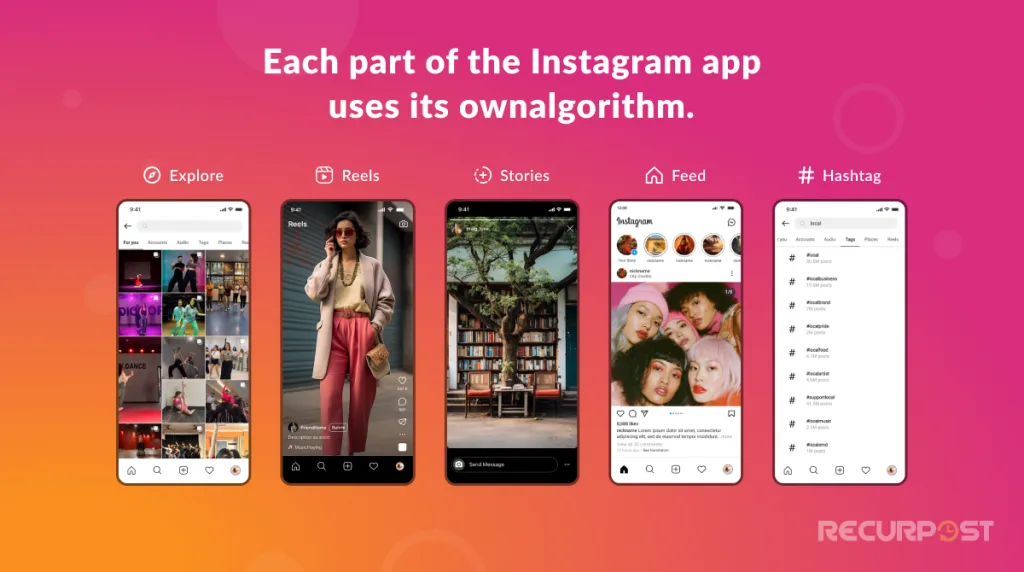
How Does The Instagram Explore Page Algorithm Work?
The Instagram Explore page algorithm analyzes these factors to recommend personalized content that increases your Instagram views:
- User Interaction: The algorithm looks at posts users have liked, commented on, and shared. The algorithm identifies patterns in the types of content each user engages with.
- Content Engagement: The algorithm favors posts that have high engagement rates (likes, comments, shares, and saves) from a broad audience, indicating that the content is popular and likely to be of interest to others.
- User Activity: It tracks user activity on the app, including search history and profile visits. The algorithm helps customize the Explore page to show content related to user interests.
- Content Similarity: The algorithm collects similar content. If a user frequently engages with posts about a particular topic, the platform will show more related posts.
- Creator Activity: It considers the activity of the content creators that a user follows. If a creator posts something that gains significant engagement, it’s more likely to appear on their followers’ Explore page.
- Timeliness: New and trending content is prioritized to ensure the Explore page features the latest and most relevant posts.
How the Instagram Reels Algorithm Works?
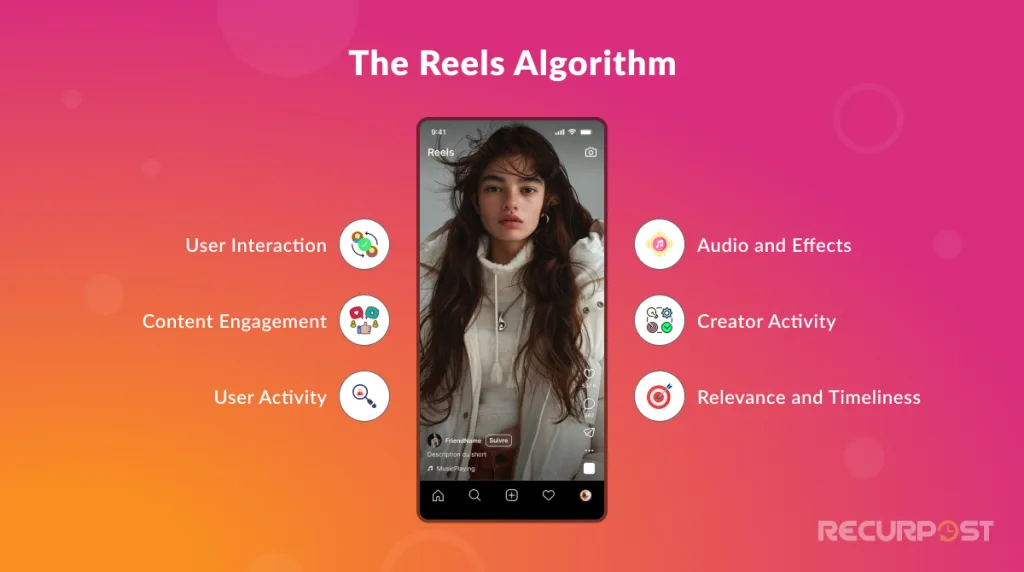
The Instagram algorithm for Reels prioritizes content based on several key factors to enhance user engagement and satisfaction:
- User Interaction: It considers the reels users like, comment on, and share. The algorithm aims to show every user more of what they enjoy.
- Content Engagement: Reels with high engagement rates, such as likes, comments, and shares, are more likely to be recommended.
- User Activity: The algorithm takes into account user activity on Instagram, including searches and the type of content users frequently interact with.
- Audio and Effects: Popular audio tracks and effects used in reels can increase their visibility as the algorithm boosts these trends.
- Creator Activity: If users frequently engage with a particular creator’s content, their reels are likely to appear in your feed.
- Relevance and Timeliness: New and trending reels are given priority to keep the content fresh and engaging.
Unlock the power of reposting on Instagram to enhance your engagement—explore how to reshare something on instagram
How Instagram Story algorithm work?
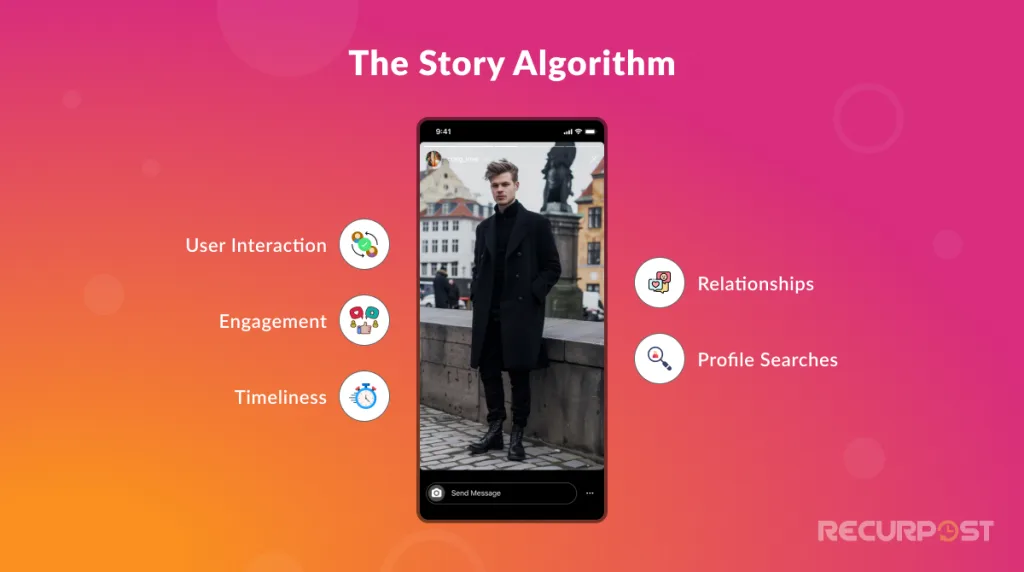
Instagram analyzes these factors to show users the most relevant stories first:
- User Interaction: Stories from accounts users frequently interact with (likes, comments, DMs) are prioritized.
- Engagement: The algorithm favors stories with high engagement rates, such as replies and shares.
- Timeliness: Newer stories are shown before older ones to ensure fresh content is highlighted.
- Relationships: Based on interaction history, stories from close friends and family are more likely to appear first.
- Profile Searches: If users often search for a particular profile, their stories are more likely to appear at the top of the user feed.
How Does the Instagram Feed Algorithm Work?
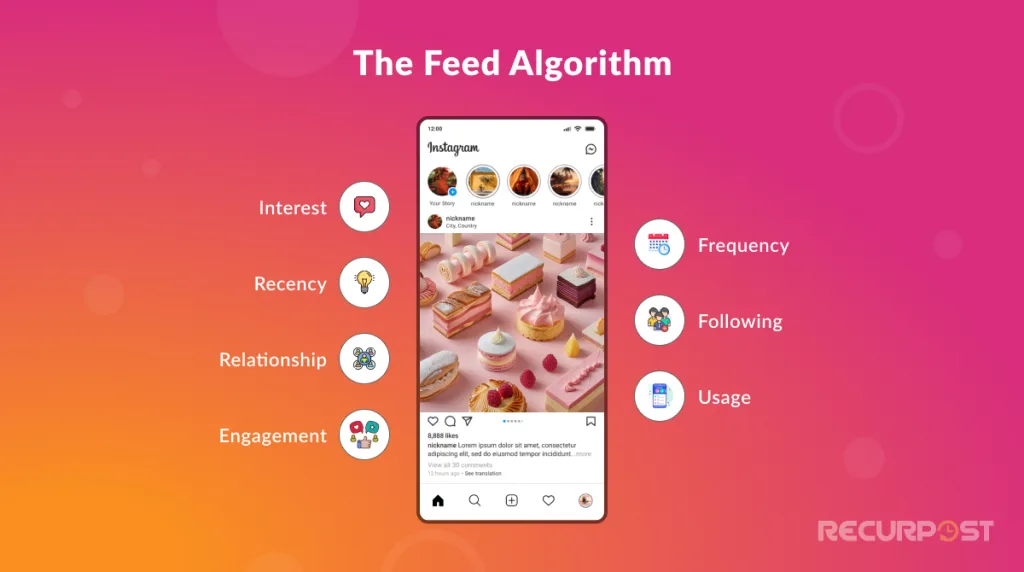
The Instagram feed algorithm delivers personalized content based on these factors:
- Interest: The algorithm predicts user interest based on their pattern, interactions, and previous history, presenting them with likable content.
- Recency: The algorithm gives priority to the latest posts rather than older ones to keep the user feed fresh with recent content.
- Relationship: The algorithm will show content from accounts users frequently interact with, including friends, family, and followed accounts.
- Engagement: Posts with high engagement rates (likes, comments, shares, saves) are considered more valuable and are prioritized in the user feed.
- Frequency: How often each user opens Instagram affects the algorithm and will show users the most relevant content since the last visit.
- Following: The user’s following list plays a major role and helps the algorithms. If a user follows many accounts, they will have a wide range of content to choose from and prioritize.
- Usage: If a user spends more time on the app, the algorithm will show them a broader range of content.
How the Instagram Hashtag Algorithm Works?
The Instagram hashtag algorithm prioritizes posts with relevant, high-engagement hashtags that enhance discoverability. Effective hashtag usage increases reach for businesses and agencies.
Insights from Adam Mosseri on Instagram’s Algorithm
In a recent series of videos, Adam Mosseri, the head of Instagram, provided detailed explanations on how the platform’s algorithm ranks content. He emphasized that Instagram uses multiple algorithms tailored to different sections of the app, such as Feed, Stories, Explore, and Reels. Each algorithm considers various signals to determine what content to display to users.
For instance, in the Feed, Instagram prioritizes content based on factors like user engagement history, the popularity of the post, information about the poster, and the user’s relationship with the poster. In Reels, the algorithm focuses on what might entertain users, considering factors like watch time and engagement.
Mosseri also addressed common misconceptions, clarifying that there isn’t a single algorithm but rather a variety of algorithms, classifiers, and processes, each serving a specific purpose. He highlighted the importance of creating engaging and original content, as the algorithm favors content that resonates with users and encourages interaction.
For a more in-depth understanding, you can watch Adam Mosseri’s explanation below:
Instagram Algorithm Updates in 2025
The Instagram algorithm underwent several significant changes in 2025, focusing on enhancing user experience and content discovery:
- Enhanced AI-powered content recognition: The 2025 update improved Instagram’s ability to understand and categorize content beyond hashtags, analyzing visual elements, text in images, and video content to better match users with relevant posts.
- Relationship-based prioritization: Instagram strengthened the relationship factor in March 2025, giving even more weight to accounts users regularly interact with through DMs, comments, and story replies.
- Content authenticity ranking: The algorithm now prioritizes original content over repurposed or reposted material, rewarding creators who produce unique posts rather than sharing existing content.
- Engagement quality metrics: Rather than simply counting likes and comments, the 2025 algorithm evaluates the quality of engagement, with meaningful comments and saves carrying more weight than quick reactions.
- Cross-platform integration: Content performance now factors in engagement across Meta platforms, with posts performing well on Facebook potentially receiving a boost on Instagram.
- Time spent viewing: The algorithm tracks how long users spend viewing specific content types, prioritizing formats that generate longer viewing sessions for individual users.
- Reduced hashtag dependence: While still relevant, hashtags have diminished in importance as the algorithm increasingly relies on content analysis and user behavior patterns to determine relevance.
These changes reflect Instagram’s ongoing effort to deliver more personalized content experiences while balancing creator reach and user satisfaction.
How to Beat the Instagram Algorithm?
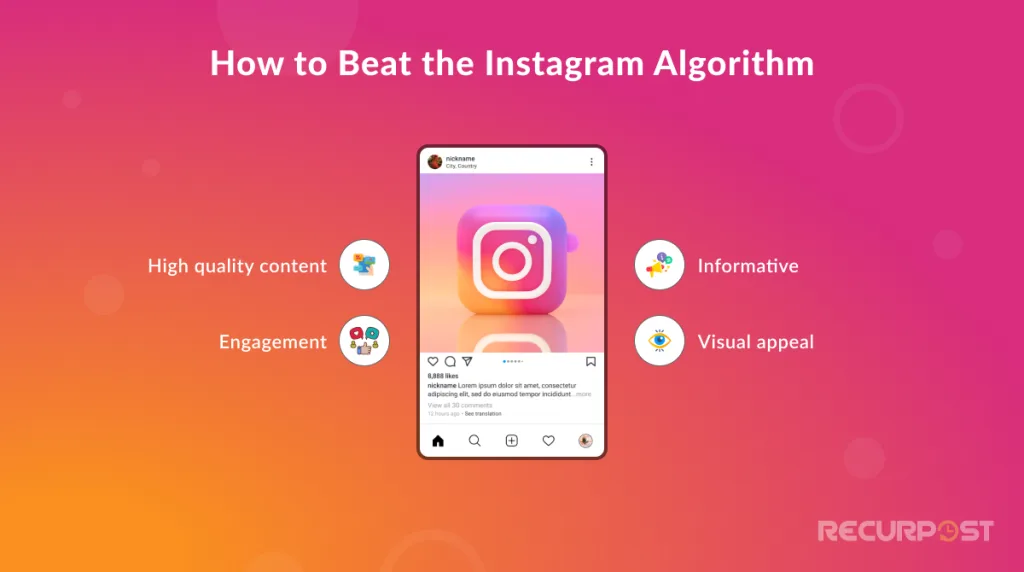
- Create high-quality content relevant to your target audience that informs, engages, and appeals visually. [Check 35 Best Instagram Post Ideas]
- Ask questions, run contests, and use interactive features like polls and stickers to boost engagement. Higher interaction rates improve your content’s ranking in the algorithm.
- Post regularly and consistently. The algorithm favors accounts that post regularly. Aim to post at least once a day, but no more than a few times a day. You can use a social media scheduling tool for this purpose.
- Use top relevant hashtags to reach a wider audience. When you use these top IG hashtags in your posts, your content will appear in the search results for those hashtags.
- Interact with other users by liking, commenting on, and sharing their content. This shows the algorithm that you are a real person and that you are interested in the Instagram community.
- Use a variety of content formats. Instagram offers a variety of content formats, including photos, videos, Reels, and Stories. Mix up your content formats to keep your audience engaged.
- Use eye-catching visuals. Instagram is a visual platform, so it’s important to use high-quality visuals in your posts. Your visuals should be relevant to your content and visually appealing.
- Write informative and engaging captions. Your captions should be clear, concise, and relevant to your post. You can also use your captions to ask questions, start conversations, and promote your other content.
- Use relevant stickers and geotags. Stickers and geotags are a great way to add personality to your posts and reach a wider audience.
- Promote your Instagram account on other platforms. Let your followers on other platforms know that you are also active on Instagram. You can do this by adding a link to your Instagram profile in your bio and by sharing your Instagram posts on other platforms. [How to Share a Post on Instagram – Learn more]
- Stay updated on Instagram algorithm changes, including any potential Instagram algorithm reset, as it rolls out updates regularly. You can follow the official pages like @Instagram and @Creators for fresh algorithm and feature updates. As soon as you get notified about any update, adapt it faster to improve your reach.
Learn About Other Social Media Algorithms
- YouTube algorithm: Learn the workings of YouTube’s video recommendations.
- Facebook algorithm: Explore how Facebook orders content in news feeds.
- Twitter algorithm: Get insights into what makes tweets more visible.
- LinkedIn algorithm: Learn how LinkedIn prioritizes posts and articles.
- Pinterest algorithm: Discover how Pinterest selects content for users.
Benefits of understanding the Instagram algorithm
Understanding the Instagram algorithm is important for a few reasons:
- Creating content that your target audience sees more frequently. The algorithm shows users content matching their interests, so understanding it helps your posts rank higher in feeds.
- Growing organically on Instagram by reaching new people interested in your content type. Using relevant hashtags makes your posts visible to users searching those topics.
- Increasing engagement rates. Users engage with interesting, relevant content in their feeds. Algorithm knowledge helps you create posts that generate likes, comments, and shares.
- Staying current with platform changes. Instagram regularly updates its algorithm, so keeping informed ensures your content reaches the right audience.
Understanding the algorithm specifically benefits:
- If you are a business owner, you can use the algorithm to reach potential customers who are interested in your products or services.
- If you are a content creator, you can use the algorithm to reach a wider audience and grow your following.
- If you are an influencer, you can use the algorithm to build your brand and work with brands that are relevant to your audience.
No matter what your goals are on Instagram, understanding the algorithm is essential for success.
Conclusion
The Instagram algorithm operates as a complex system considering various factors and metrics when ranking content. Understanding these principles and metrics helps you create content your target audience sees more frequently.
Consistent quality content creation, active audience engagement, and strategic post scheduling directly affect your Instagram success.
Scheduling Instagram posts when your audience is most active boosts engagement and visibility. Adapt your strategy as the algorithm evolves to maintain effectiveness.
Post scheduling represents one factor affecting Instagram’s algorithm. For comprehensive information about all social platform algorithms, see our Social Media Algorithms Explained guide.
Frequently Asked Questions
1. Does editing an Instagram post affect the algorithm?
Editing Instagram posts affects initial engagement and discovery, so minimize edits after posting. When you edit a caption or post, Instagram doesn’t re-push your content to the top of followers’ feeds. The algorithm tracks the original posting time rather than the edit time. Substantial edits to captions, especially removing or changing hashtags, can disrupt the post’s performance in hashtag feeds.
For Reels, editing after posting can reset engagement metrics in some cases, potentially reducing reach. The 2025 algorithm update maintains this approach, with the first 24-48 hours of engagement remaining the most critical period for post performance.
2. How do I increase my Instagram algorithm?
To improve your performance with the Instagram algorithm, create high-quality content relevant to your target audience and encourage engagement.
3. Why is my Instagram doing so badly?
Your Instagram may be doing so badly because you are not posting regularly, creating high-quality content, or engaging with your audience.
4. What is the best time to post on Instagram?
The Instagram algorithm’s best time to post varies depending on your audience, but generally speaking, it is best to post during the day when people are most active on the app to maximize visibility in the feed.
5. How does Instagram’s view work on the story?
Instagram story views are counted each time a user watches your story, and the algorithm prioritizes showing your stories to users who engage with your content frequently.
6. How to understand the Instagram algorithm?
Focus on engagement, relevance, and timeliness to optimize post visibility with the Instagram algorithm.
7. How does Instagram rank story viewers?
Instagram ranks story viewers based on who interacts with your content the most, prioritizing those with whom you have the most engagement.

Dr. Dinesh Agarwal, founder of RecurPost, transformed from academic researcher to social media technology innovator in 2013. With a doctorate in Cloud Computing, he applied scientific principles to develop a pioneering social media management tool that streamlined content scheduling processes for digital marketers, leading to its successful acquisition. Today, his RecurPost platform serves as an enterprise-grade social media automation solution helping over 100,000 businesses optimize their online presence. Dr. Agarwal actively contributes to the social media marketing ecosystem through educational content, including conference presentations, podcast interviews, and in-depth articles focusing on social media optimization techniques and algorithmic content distribution strategies.
